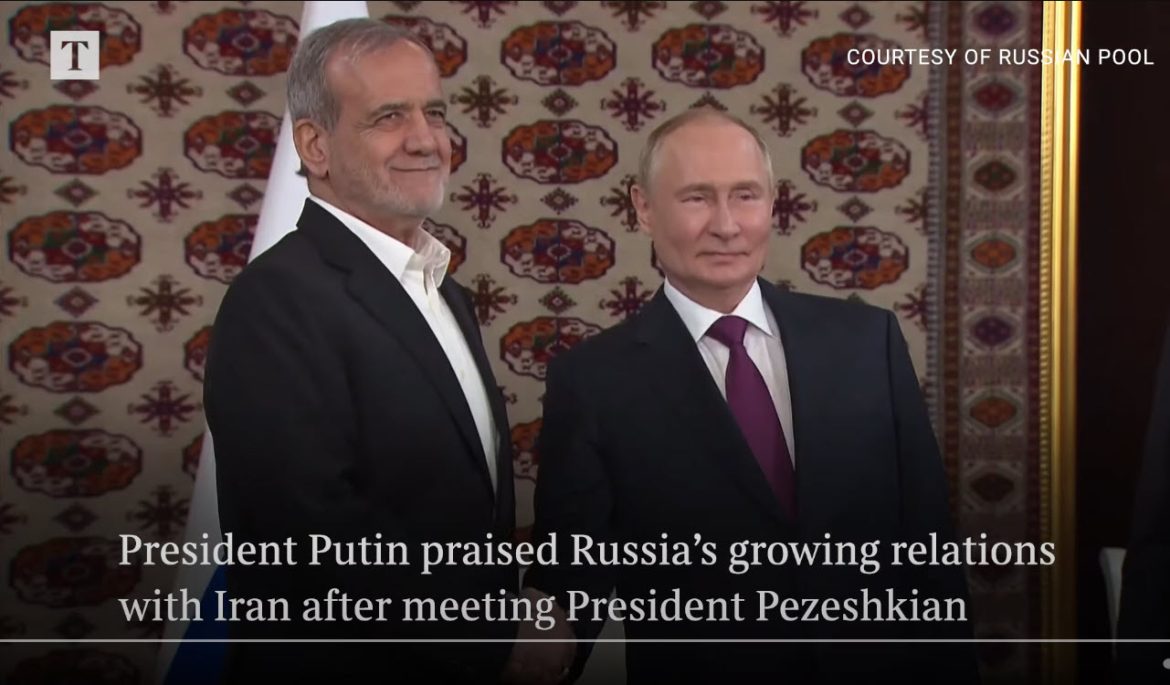Russian President Vladimir Putin met with Iranian President Masoud Pezeshkian on Friday, reaffirming the deepening alliance between their two countries. The talks, which took place on the sidelines of a cultural commemoration event in honor of Turkmen poet Magtymguly Pyragy, centered on expanding economic ties and aligning geopolitical strategies. Both leaders hailed the evolving partnership as part of what Putin described as a “new global order,” a phrase that underscores their shared opposition to Western dominance.
The meeting comes at a critical time, as both Russia and Iran are at odds with the United States and the European Union over a range of issues, including Russia’s ongoing war in Ukraine and Iran’s nuclear ambitions. Putin, who frames his confrontation with the West as part of a broader existential struggle against what he describes as an “arrogant and self-interested” Western bloc, is actively seeking to deepen ties with nations in the so-called Global East and Global South, positioning these relationships as the backbone of a new world order.
During their discussions, Putin and Pezeshkian celebrated the growing economic cooperation between Russia and Iran, highlighting joint projects in energy, infrastructure, and military sectors. “Economically and culturally, our communications are being strengthened day by day and becoming more robust,” Pezeshkian said, according to Iran’s state IRNA news agency. The two leaders also emphasized their shared vision on international affairs, including their opposition to U.S. sanctions and their support for the Assad regime in Syria.
Putin used the opportunity to invite Pezeshkian for an official visit to Russia, a proposal the Iranian president promptly accepted. The invitation comes ahead of a major diplomatic event, as Russia is set to host the BRICS summit in Kazan from October 22-24. The BRICS nations, consisting of Brazil, Russia, India, China, and South Africa, are increasingly seen as a counterweight to Western-dominated international organizations. By strengthening relations with Iran, Putin is signaling his commitment to building a more multipolar world, where non-Western countries can exert greater influence on global affairs.
The growing ties between Moscow and Tehran, however, are viewed with concern in Washington and across European capitals. U.S. officials have expressed alarm at the prospect of a stronger Russia-Iran axis, fearing that it could further destabilize global politics and hinder diplomatic efforts in critical regions such as the Middle East. The collaboration between the two countries is particularly significant given their history of supporting the Assad regime in Syria, their shared defiance of international sanctions, and their mutual goal of curbing U.S. influence.
As Putin continues to champion a “new global order,” this meeting solidifies Russia’s pivot towards nations that are similarly alienated from the Western-dominated international system. The strengthened partnership between Russia and Iran represents a shift in the global balance of power, with both countries asserting their right to pursue their own interests independently of Western pressures.
For now, both nations are committed to further deepening their ties. As they prepare for the upcoming BRICS summit in Kazan, the world will be watching closely to see how this burgeoning alliance could reshape global geopolitics in the coming years.



